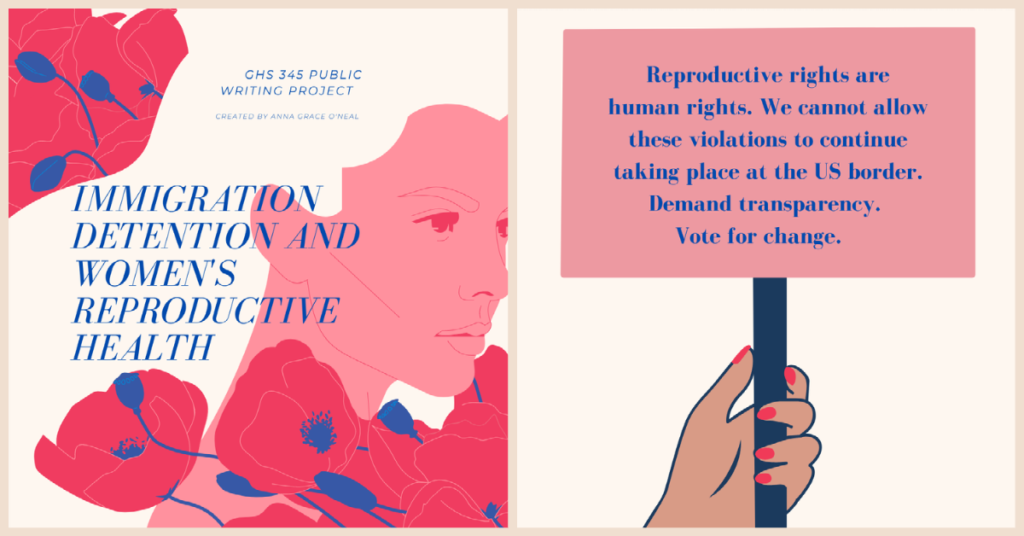Dr. Amy Nichols-Belo wanted her students to share their writing and research not just with her but with the larger world.
The fall semester was the second time she taught Gender and Health (GHS/ANT/WGS 345) at Mercer University, but it was the first time she incorporated a public writing component.
“I thought that having students write research papers that only I was reading wasn’t the best way to get information out into this world,” said Dr. Nichols-Belo, associate professor of global health studies and anthropology and chair of the International and Global Studies Department. “If there’s ever a time for people to be engaged publicly, it’s now.”
The upper-level course looked at topics such as sexual and gender identity, gender-based violence, reproductive health, population control and masculinity. In addition to other readings, assignments and discussions, the 27 students researched a topic of their choosing that was relevant to gender and health and published a polished piece on the online platform Medium, a personal blog or another public venue.
“Public writing matters, especially in an election year and when we have a public health crisis,” according to Dr. Nichols-Belo’s assignment description. “While we may be scholars, it’s important to be able to communicate effectively with a broad and not necessarily well-informed audience. At the same time, rigorous citation, use of evidence, and argumentation remain critical.”
Dr. Nichols-Belo began the semester thinking her students — all global health studies, anthropology and women’s and gender studies majors or minors — would do Medium-style blog posts or New York Times-style op-eds for their projects. But after seeing the quality of analysis on their discussion boards, she knew they could do something above and beyond and allowed them to pursue more creative formats if they desired.
“When you give them permission to be creative but also permission to not be perfect, then I think that’s valuable,” she said. “I was as interested in the process as the product itself. I wanted them to really think about the process of creating something for the public.”
Several students created articles or blog posts. Senior Danielle Countryman, who is triple-majoring in anthropology, global health and international affairs, published an article on Medium about the HPV vaccine, why there is opposition to it and its implications for reproductive care.
Jenna Oldja, a junior double-majoring in religion and global health, created a Wix website to publish a blog on “period poverty” and access to menstrual products.
“I thought it was a really relevant and important space to talk about this topic. I don’t know where else I would have gotten the space to be able to talk about things like that,” she said.
She brought the research from her project full-circle in mid-November by holding a program on period poverty at Porter Hall, where she is a resident assistant.
Ally Driver, a senior global health major, wrote an op-ed-style piece on the nomination of Amy Coney Barrett to the Supreme Court and shared it through a series of photos on a Twitter account she created.
Other students chose more nontraditional formats. Senior Jaydon Taylor, a global health major, filmed a video [shown at the top of this story] where he and friend Caleb Brown, a Mercer alumnus, talked about Black men and mental health in America as he gave Brown a haircut. He shared a clip of the video on his Instagram account. Taylor said it’s a topic that “gets swept under the rug” and not addressed.
“(The barbershop) is a safe haven we can go to,” Taylor said. “If we can start the conversation about mental health in the barbershop, then it can lead to a larger discussion elsewhere.”
Tamara Barnard, a senior double-majoring in global health and anthropology, created six one-minute TikTok videos about women’s reproductive rights.
“We talked a lot about women’s reproductive rights in class, and it really gave me a new perspective. With it being a political year, I just felt like it was important for me to speak up and give everyone the knowledge I had gained from this course,” she said. “I tried to cram all the information into the videos in a way that was funny and relatable.”
Junior Anna O’Neal, a Spanish and global health double-major, created a set of nine infographics in English and Spanish that looked at the treatment of women in immigration centers and how that affects their reproductive health. She published them on her personal Facebook and Instagram pages.
“It was the first time I really had to rely on myself and figure out a topic and put out a project without any constraints,” said O’Neal, who is pre-law. “It was a great experience. I felt like I gained a whole lot and learned a lot of practical experience through the project.”
Barnard, who plans to go to graduate school to earn a Master of Public Health, said she learned more from this course than any other class she has taken. It was so relevant to real life, and she now feels like she can go out into the world and discuss these issues.
Driver, who has applied for master’s and Ph.D. programs in public health, said she changed her major to global health after taking a class with Dr. Nichols-Belo her freshman year. This gender and health course built upon the knowledge she had already gained and opened her eyes to a lot of things she had no idea about.
“I really enjoyed the dialogue I would have with my classmates,” said Countryman, who is interested in health research. “I liked that we were able to see how gender and health related to one another and how they related to other things in life, politics, religion and your own personal philosophy. It thought it was very interesting.”








